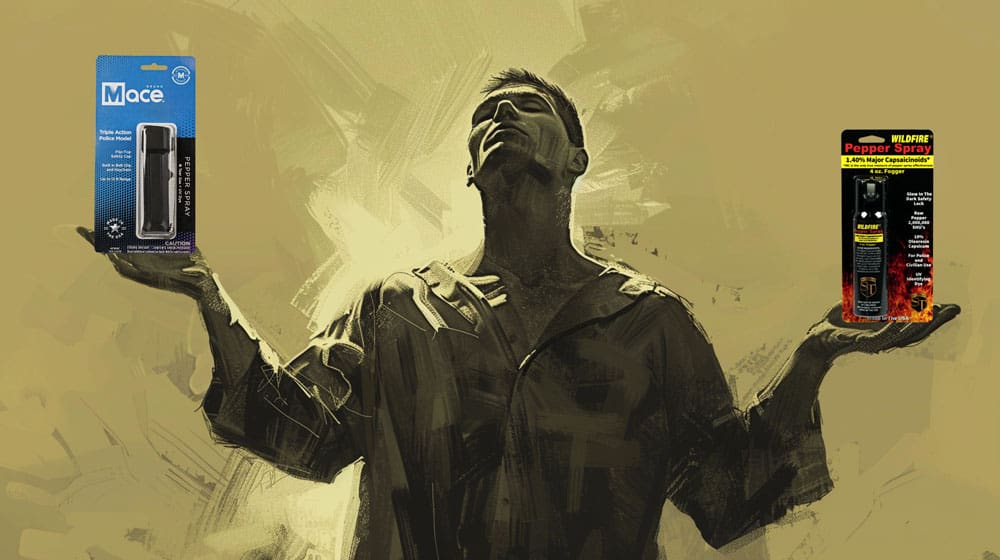In personal defense, pepper spray and Mace often stand misunderstood as two sides of the same coin. However, their nuances reveal a broader spectrum of self-protection tools.
Mace is a brand name. It has become interchangeable with pepper spray. Just like the brand name Taser has become interchangeable with stun guns.
You’ve likely heard their names interchangeably, but digging beneath the surface uncovers distinct differences in composition, legalities, and effects. Understanding these distinctions becomes crucial as you stand at the crossroads of choosing the right option for your safety.
Why might one be more suitable for your needs than the other? Let’s explore the key factors that set them apart, guiding you toward an informed decision on your path to personal security.
Key Takeaways
- Pepper spray and Mace are different; pepper spray primarily uses OC, while Mace can contain OC and CS or CN tear gas.
- Mace® Brand has evolved to include OC in its products, aligning more closely with pepper spray’s active ingredients.
- Legal considerations differ: pepper spray is legal in all 50 states, whereas Mace’s legality can vary due to its potential inclusion of CN tear gas.
- Both products aim to incapacitate attackers, but pepper spray is widely recognized for its safety and effectiveness.
What Is Pepper Spray?

Pepper spray, derived from the natural substance oleoresin capsicum (OC) found in hot peppers, immediately causes burning sensations in the eyes, nose, and mouth upon contact. This powerful inflammatory agent doesn’t just irritate; it incapacitates. Imagine feeling an intense, fiery discomfort that overwhelms your ability to see, breathe normally, or even open your eyes. That’s the quick-acting effect of pepper spray. It’s designed to stop attackers in their tracks, giving you a chance to escape. The essence of this self-defense tool lies in its active ingredient, OC, which is the same compound that gives chili peppers their heat.
What makes pepper spray stand out as a personal safety device is its effectiveness and accessibility. It’s legal in all states, and you can easily find it in various forms suitable for personal carry. When sprayed, it can incapacitate an individual for anywhere from 15 minutes to over an hour. This duration is critical; it provides ample time to escape a threat. In self-defense, few tools are as immediate and disabling as pepper spray, making it essential for anyone’s safety arsenal.
Understanding Mace
Now that we’ve explored pepper spray let’s turn our attention to Mace, a product that has become nearly synonymous with self-defense sprays. While the term ‘Mace’ was originally associated with a specific formula, it has evolved significantly. Today, when considering Mace for your safety, you’re looking at a range of products under the Mace® Brand.
Mace has transformed to become a leading name in personal safety. Here are some key points to understand about Mace and its place in self-defense:
- Mace® Brand pepper sprays contain oleoresin capsicum (OC) and CS tear gas, offering a powerful combination for stopping an assailant.
- The original Mace formula used CN tear gas, but modern iterations have improved with the inclusion of OC for more effective incapacitation.
- Mace® Brand is synonymous with quality, providing reliable pepper spray products designed for personal safety.
- The evolution of Mace includes a focus on enhanced formulas, ensuring users have access to effective self-defense tools.
Understanding Mace means recognizing its role as a trusted name in self-defense, backed by a commitment to quality and efficacy. Whether exploring options for personal safety or seeking to understand the differences between various self-defense sprays, Mace® Brand offers a range of products catering to diverse needs.
Key Differences
Understanding the key differences between Mace and pepper spray is crucial for choosing the right self-defense tool. While both serve as self-defense products, their composition and effectiveness vary significantly. Pepper spray contains oleoresin capsicum (OC), derived from hot peppers, which guarantees an immediate and intense burning sensation upon contact. This reaction includes temporary blindness and incapacitation, making it a widely preferred option for personal safety.
On the other hand, Mace, a specific brand of self-defense products, historically contained tear gas and UV dye, which was less effective, especially on individuals under the influence of alcohol or drugs. Although Mace and pepper spray now share similarities in ingredients, with many Mace products incorporating OC, it is still considered safer and more effective due to its natural, potent components.
The choice between Mace and pepper spray hinges on understanding these differences. Pepper spray’s ability to cause severe discomfort and incapacitation, derived from its natural, hot pepper base, sets it apart from Mace’s original formula. This makes pepper spray a more reliable option for ensuring your safety in threatening situations.
Legal Considerations

Before you decide on the best self-defense spray for your needs, it’s crucial to consider the legal landscape surrounding pepper spray and Mace. While pepper spray is legal in all 50 states, the addition of CN tear gas in some Mace products can make them illegal in certain areas. It’s not just about choosing a self-defense spray; it’s about ensuring you’re not unknowingly breaking the law.
Here are some key points to keep in mind:
- Pepper spray laws vary by state, with regulations on use, purchase, and canister size.
- Mace vs. pepper spray legality: Mace containing CN tear gas might be restricted or illegal in your state.
- States like California and New York have specific restrictions, including limits on canister sizes and sales channels.
- Always research state laws before purchasing to ensure compliance and avoid legal issues.
Understanding the legal differences between pepper spray and Mace is essential for anyone carrying these products for self-defense. You want to protect yourself effectively without inadvertently stepping outside the law.
Choosing Between Them
When deciding between pepper spray and Mace, weighing their effectiveness, safety, and legal status is crucial. You’re faced with a choice: the traditional yet improved Mace or the widely recognized pepper spray. Understanding the difference between Mace and pepper spray is key. While both aim to incapacitate, pepper spray, with its oleoresin capsicum (OC) formula, is generally seen as more effective and safer. This is especially true when you need a reliable defense against attackers, even those under the influence of substances.
Mace has evolved as a brand, incorporating OC pepper spray in its products to enhance effectiveness. However, regarding Mace and pepper spray, remember that some Mace products might still contain CN tear gas, which has restrictions in certain areas due to its hazardous nature. Legality is a significant factor; pepper spray holds the advantage of being legal in all states.
Consulting with experts can offer valuable insights into the best option for your needs, considering the desired incapacitation time, safety concerns, and legal implications. Making an informed decision between Mace and pepper spray ensures you choose the most effective and appropriate self-defense tool.
Frequently Asked Questions
Is Mace Spray Legal in the US?
Imagine navigating a maze of laws: Mace spray’s legality in the US depends on its ingredients and state regulations. Legal variations exist, so you’ve gotta check local laws to ensure you’re not stepping out of bounds.
Do Cops Use Mace or Pepper Spray?
Cops primarily use pepper spray, not mace, as a law enforcement tool. The tactical differences and training protocols highlight its effectiveness in controlling situations without causing permanent harm, making it a preferred method for police.
What Is More Effective Than Pepper Spray?
Due to their chemical differences, you might find gel alternatives or personal alarms more effective than pepper spray. These options can offer advantages in certain situations, enhancing your self-defense strategy beyond traditional sprays.
Will Pepper Spray Stop an Attacker?
Yes, pepper spray can stop an attacker by causing intense pain and incapacitation, making it a crucial part of your self-defense techniques. It’s effective even against those under the influence, offering a reliable alternative.


